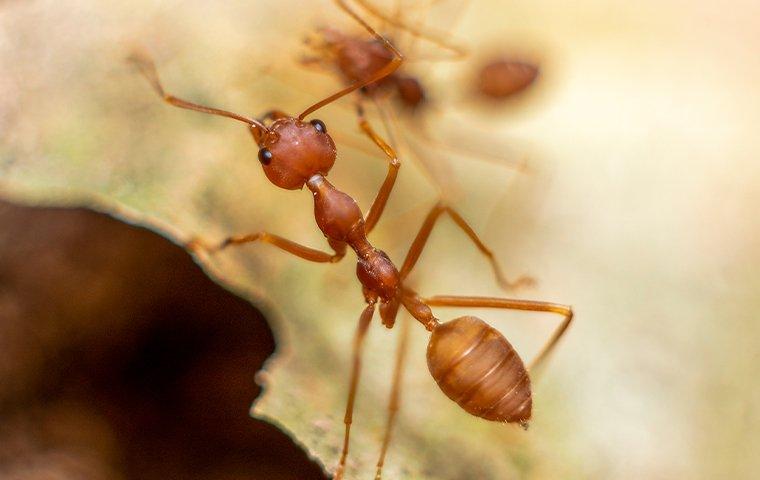Ants can be found everywhere, and that includes inside your Dallas home. They take over quickly and are a nuisance pest. If you find ants in your Dallas home, you need to take action quickly. Check out this guide to ant control and handle your problem before it gets out of hand.

Ants In Dallas
Several types of ants can be found in Dallas and the surrounding area. While some are merely a nuisance, others are downright dangerous. In any case, none of them should be welcome around your home.
Fire Ants
Perhaps the most harmful type of local ant, the fire ant has a strong venom and a sting that hurts for days. If you don’t have a bad reaction to a fire ant bite, you’ll still feel significant pain. But if you do have a reaction, there’s a chance that you could end up in the hospital after an encounter with these ants.
Because fire ants nest in large colonies, they will take over your backyard. They often attack in numbers, which puts you and your family at risk for multiple bites.
Odorous House Ants
Although these ants don’t sting or bite, they are the epitome of a nuisance pest. When squished or threatened, odorous house ants smell like rotting eggs. Their colonies grow at an exponential rate and it won’t take long for a colony to invade your home.
Carpenter Ants
Carpenter ants are notorious for their ability to damage wood. They don’t eat wood, but they do tunnel through it. As they do, carpenter ants cause significant damage. In addition to destroying your furniture, they may also impact the structural integrity of your home.
It’s important not to confuse these ants with acrobat ants. While the two types of ants look similar, acrobat ants raise their abdomens when they are bothered.
What Factors Attract Ants?
Despite the many differences between the types of Dallas ants, there are a few similarities. For instance, they are all attracted to similar conditions. All of the following could bring ants onto your property:
- Food – Crumbs, dry goods, or leftover food will attract most species of ants. After a meal, you should clean your counters and table of crumbs. It’s also important to sweep and vacuum your floors. Store all of your food in sealed containers and you might be able to prevent an infestation.
- Moisture – In order to survive, ants need moisture. They are often attracted to areas of your home that have high moisture levels, such as poorly ventilated bathrooms. Be sure to have adequate ventilation throughout your home and repair any leaky fixtures. If any rooms have high moisture levels, use a dehumidifier to make the space less appealing to ants.
- Leaf And Debris Piles – The condition of your backyard could attract ants and other pests into your home. Instead of leaving leaf and woodpiles in your yard, remove them. At the very least, keep them away from your home. You should also trim back any trees or shrubs that directly touch your home.
Keeping Your Home Free Of Ants
In addition to eliminating the factors that attract ants, you should also eliminate all entry points. Due to their small size, ants can enter your home through the tiniest of crevices. Look for gaps under your door, broken screens, and cracks in your foundation.
After you seal up all of the potential entrances, you could still experience problems. It’s almost impossible for homeowners to keep ants out without professional assistance. Their small size, resilient nature, and ability to survive in harsh environments makes them difficult to keep away.
If you find yourself struggling with an ant problem, contact Evolve Pest Control. Call today to hear how we can help with ants and other pest control needs at home or pest management for your commercial property.

